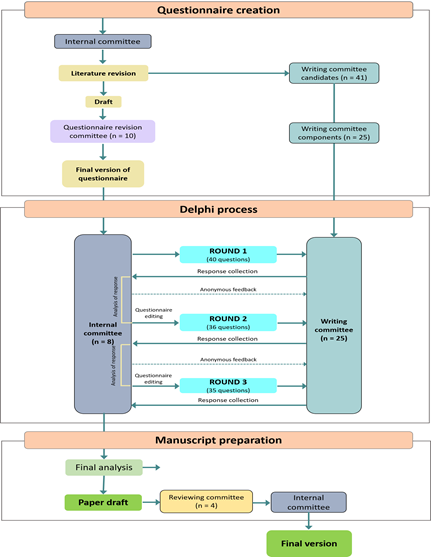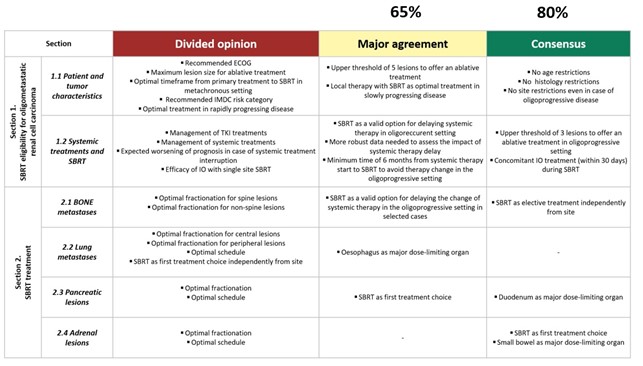ESTRO 2024 Congress report
Renal cell carcinoma is one of the most frequently diagnosed cancers of the kidney, accounting for approximately 85% of all malignant kidney tumours. The high risk of distant metastases represents a substantial clinical problem. Among patients with renal cell carcinomas, about 25% have regional and distant metastases at the time of diagnosis, while for renal cell carcinoma patients who initially present with localised disease, up to 40% eventually develop metastatic disease.
Historically, in both primary and metastatic renal cell carcinoma the use of radiotherapy has been limited to palliative purposes, given the radioresistance of the tumour itself to conventional fractionation treatments. However, technological advances in the field of radiotherapy have enabled the use of stereotactic ablative radiotherapy (SABR) in patients with oligometastatic renal cell carcinomas who have a limited number of metastases (between three and five).
Hence there is an increasing role for SABR in synchronous and metachronous oligometastatic tumours, and in the context of oligoprogression in combination with systemic therapies. To date, several open questions remain regarding the management of oligometastatic renal cell carcinomas with SABR.
The purpose of this study, which is supported by ESTRO and the European Association of Urology (EAU), is to investigate expert opinion on the management of patients with oligometastatic and oligoprogressive renal cell carcinomas through the use of SABR to treat extracranial metastases, with the aim of developing recommendations for patient selection, treatment doses and systemic therapy concomitant to radiotherapy treatment. For this purpose, the Delphi consensus methodology (Figure 1) was applied by sending three rounds of questionnaires to clinicians identified as opinion leaders in the field of renal neoplasm treatment. At the end of the third round, consensus was reached on eight of the 37 questions (Figure 2). In particular, the panel members agreed that there should be no restriction regarding the age or clinical history of candidates for SABR to combat primary renal cell carcinomas in regard to the maximum threshold of three lesions to offer ablative treatment in patients with oligoprogression, or on the possibility of concomitant administration of immunotherapy drugs together with radiotherapy.
SABR was indicated as the treatment modality of choice for renal cell carcinoma oligometastases and for adrenal oligometastases. No consensus or major agreement was reached regarding the appropriate schedule; this finding may guide future efforts to decide on such a schedule. The results of this Delphi consensus highlight that discordant opinions persist regarding how to approach oligometastatic renal cell carcinomas, given the lack of phase 3 studies and the need for further efforts to develop studies that generate high-level evidence to guide clinical practice. This ESTRO consensus could serve as a practical guide regarding the use of SABR in oligometastatic renal cell carcinomas. It emphasises the essential role of the radiation oncologist in the multidisciplinary team and highlights the main areas of disagreement, which can be used to guide future efforts to fill knowledge gaps.

Figure 1: The Delphi consensus methodology

Figure 2: Overview of the main areas of consensus, major agreement and divided opinion
References:
Symposium Track: Interdisciplinary, guidelines. Presented by Marvaso Giulia MD: A Delphi consensus study on stereotactic body radiotherapy for oligometastatic renal cell carcinoma (RCC), an ESTRO study – with EAU endorsement.
Marvaso G, Jereczek-Fossa BA, Zaffaroni M , Pasquier D, Siva S, et al. Delphi consensus on stereotactic ablative radiotherapy for oligometastatic and oligoprogressive renal cell carcinoma ‑ a European Society for Radiotherapy and Oncology study endorsed by the European Association of Urology. Lancet Oncol. 2024 May;25(5):e193-e204. doi: 10.1016/S1470-2045(24)00023-8.
Dr Giulia Marvaso

Member of the ESTRO urology focus group
Division of Radiation Oncology, European Institute of Oncology, IRCCS, Milan, Italy
Assistant professor
Department of Oncology and Hemato-oncology, University of Milan, Milan, Italy